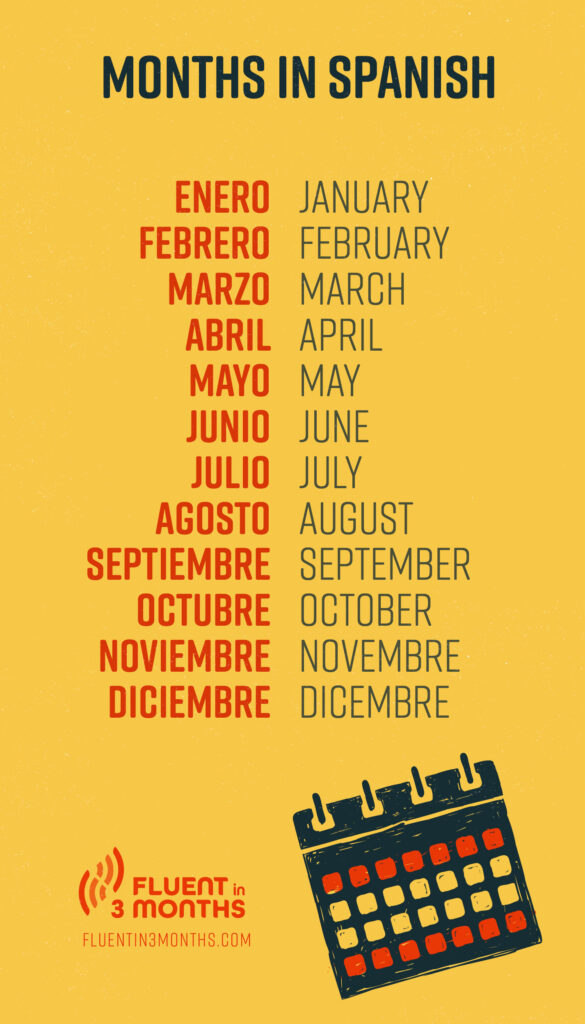![Months of the Year in Spanish [with Audio] Months of the Year in Spanish [with Audio]](https://thenewsbreak.buzz/wp-content/uploads/2024/07/months-in-spanish.jpg)
Learning the months in Spanish might make you think of French, Italian, and even English months. They’re all very similar!
By learning the months in Spanish, you can start talking about your yearly plans in Spanish, whether that’s traveling to Spain in julio, studying Spanish in septiembre, or listening to Latin music todo el año!
Months of the Year in Spanish: Los meses del año
Let’s start by listing the Spanish months:
- Enero: “January”
- Febrero: “February”
- Marzo: “March”
- Abril: “April”
- Mayo: “May”
- Junio: “June”
- Julio: “July”
- Agosto: “August”
- Septiembre: “September”
- Octubre: “October”
- Noviembre: “November”
- Diciembre: “December”
As Spanish is a phonetic language, months are pronounced the same way they are written. While different Spanish-speaking countries have their accents and regional variations, the pronunciations of months will always be similar.
Here is a guide on how to pronounce the Spanish months:
| English | Spanish | Pronunciation | Audio |
|---|---|---|---|
| January | Enero | /ˈeneɾo/ | |
| February | Febrero | /feˈβɾeɾo/ | |
| March | Marzo | /ˈmaɾθo/ | |
| April | Abril | /aˈβɾil/ | |
| May | Mayo | /ˈmaʝo/ | |
| June | Junio | /ˈxunjo/ | |
| July | Julio | /ˈxuljo/ | |
| August | Agosto | /aˈɣosto/ | |
| September | Septiembre | /sepˈtjemβɾe/ | |
| October | Octubre | /okˈtuβɾe/ | |
| November | Noviembre | /noˈβjemβɾe/ | |
| December | Diciembre | /diˈθjemβɾe/ |


Seasons in Spanish
Each month belongs to a season, so why not combine months in Spanish with the seasons? With only four more words, you’ll open many more discussion topics, which we’ll cover in the next section.
Here are the Spanish seasons:
- La primavera: “Spring”
- El verano: “Summer”
- El otoño: “Autumn/Fall”
- El invierno: “Winter”
Time to Practice: Useful Sentences Featuring Spanish Months
Now that you know about the months and seasons in Spanish, let’s take a look at some questions and their answers in Spanish. Months can come up at any time during your Spanish conversations, such as when you’re talking about your birthday, holiday plans, or the weather.
| English | Spanish | Audio |
|---|---|---|
| “When is your birthday?” | ¿Cuándo es tu cumpleaños? | |
| “My birthday is in February” | Mi cumpleaños es en febrero. | |
| “What is your favorite month?* | ¿Cuál es tu mes favorito? | |
| “My favorite month is June because I like summer.” | Mi mes favorito es junio porque me gusta el verano. | |
| “Do you have plans for the summer holidays?” | ¿Tienes planes para las vacaciones de verano? | |
| “In August, I’ll visit my friend in Mexico.” | En agosto, voy a visitar a mi amigo/a en México. | |
| “What is the weather like in winter in Colombia?” | ¿Cómo es el clima en invierno en Colombia? | |
| “Winters, from December to February, are not cold in Colombia. | Los inviernos, de diciembre a febrero, no son fríos en Colombia. |
FAQ on Spanish Months
What is “month” in Spanish?
“Month” in Spanish is mes. It’s a masculine word so it would be un mes (“a month”) or el mes (“the month”). In plural, el mes is los meses.
Are Spanish months masculine or feminine?
All months in Spanish are masculine. This means that you would use masculine articles and adjectives when referring to them. For example, you would say este marzo, which means “this March” using the masculine article este (“this”).
Are Spanish months capitalized?
The Spanish months aren’t capitalized like in English, unless they are at the beginning of a sentence or they are referring to an important date or place. Here are some examples:
Hace calor en julio: “It’s warm in July” (No need to capitalize julio here as we did with the English “July.)
Cinco de Mayo: “Fifth of May” (Here, we capitalized Mayo as it talks about the Cinco de Mayo celebration in particular.
Plaza de Mayo: Similarly, Plaza de Mayo is a proper noun, referring to the Plaza de Mayo city square in Buenos Aires, Argentina.
Learning the Months Is a Great Step for Your Spanish!
Now it’s time to improve your vocabulary to describe your months in more creative ways! Take a look at our Spanish resources or check out our other Spanish articles.